Quentin Tarantino's first job in Hollywood was scooping poop on the set of a Dolph Lundgren workout video. That story is less well known than his legendary rise from video store clerk to "voice of a generation," but we all have to start somewhere and for Tarantino that meant working as a production assistant on Lundgren's Maximum Potential:
Tarantino got the gig because the video's producer was a regular at Video Archives and offered several of the employees a chance to PA. Part of their grunt work included clearing all of the dog shit away from a grassy area in Venice Beach which was going to be used for one of Lundgrunden's workout sessions. Turning to his friend Roger Avary, Tarantino joked, "This is literally a shitty job."
It would take him years to convince Hollywood that his actual work wasn't shit. Early script readers rejected True Romance for having too many f-bombs. Audiences ran out of Reservoir Dogs. " Pulp Fiction is shit!" is what Tarantino heard being shouted from the crowd as he walked up to the stage to accept the Palm d'Or at Cannes 1994.
However, whether he predicted where culture was going or helped cause the evolution or a bit of both, Tarantino's early violent movies don't look so violent anymore, his vulgarities aren't so jarring, and his efforts to elevate what people of the time would have called "trash culture" now just looks like normal pop culture. His only tool left to outrage and offend is his unapologetic use of the n-word and similar words like it, repeatedly foisting charged racial epithets at us in a way that hasn't aged well.
Either way, Tarantino is part of the Hollywood establishment now, and with his career far closer to its end than its beginning it's been fun looking back and ranking his filmography. Yesterday, I ended with From Dusk Till Dawn as my pick for his 8th best film. Today, here are my picks for #7-5. Tomorrow, I'll have my top 4.
7. Once Upon a Time in...Hollywood (2019)
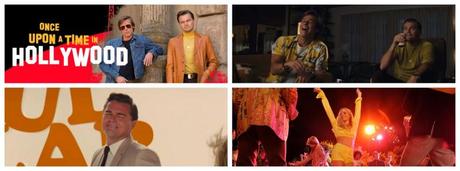
What It's About: A day or two in the life of a Hollywood has been (Leonardo DiCaprio), his loyal gofer/stuntman (Brad Pitt), and a young starlet on the rise (Margot Robbie). That starlet just happens to be Sharon Tate.
Backstory: On one of Tarantino's prior movies, a well-known actor - he won't say who - made a surprising request. This person wondered if maybe they could give his stuntman a small on-camera role in the movie, a kind of reward for so many years of work together. Tarantino complied, and after they filmed the stuntman's small role he went over to pay him some compliments. The stuntman, however, wasn't really having it. Sure, getting to actually act instead of being run over by a car or thrown off a building was fun and all, but his primary concern was making his boss look good. Actually stepping in front of the camera on his own was just a distraction from that.
Why didn't he want the spotlight? How could someone be so free of ego? What's it like to so willingly make yourself subservient to someone else's career? And what is that relationship between star and stuntman really like?
All of this intrigued Tarantino, and he filed it away in his mind as something he'd like to explore one day, maybe using one of the most famous star-stuntman relationships - Burt Reynolds and Hal Needham - as a template. However, he was equally fascinated with old TV actors like George Maharis and Edd Byrnes and how they tried to ride the turbulent waves of the late 60s when the New Hollywood movement was about to take over, leaving them either pitiable relics or respected elder statesman who managed to change with the times.
Add on top of that his own personal memories of what it was like to live in LA in 1969 when the Manson Family murders happened and you get Once Upon a Time...in Hollywood.
Quentin's Take: "I think all of my movies are achingly personal, alright? I'm usually dealing with something in my life and I disguise it with genre, so people don't realise. However, this isn't a genre movie, so the personalness is more on the surface. And where the real personal point of view comes into it is the fact that I was a resident of Los Angeles County in 1969. I remember what was on TV. I remember the products. I remember the billboards. I remember everything. "
My Take: After nearly three decades of filling his character's mouths with pop culture references, it's astonishing to think that Tarantino has only just now fulfilled the Hollywood cliche of making a movie almost exclusively about people who work in Hollywood. Once Upon a Time is thus his contribution to the rich subgenre of movies which pay homage to the dream factory and the eternal hope that while a new star is born every day everyone is due their own comeback.
Tarantino's already had several of the latter - Kill Bill, Inglourious Basterds both being critical turning points. Those hoping for this to be yet another comeback for him after the divisive Hateful Eight will likely be disappointed. This isn't an entirely new direction but instead a melding of prior hits, mixing the leisurely-paced character study of Jackie Brown with the period pieces touches of Inglourious Basterds and adding in a new dose of surprising compassion.
The guy finally has enough years on him to emotionally understand the story of middle-aged desperation, and he couldn't have picked a better cast. Robbie does her best to radiate off the screen and DiCaprio and Pitt are often electrifying, turning a purposefully shapeless story into something routinely captivating. As with everything he's made since Inglourious Basterds, though, he could have easily chopped 10-20 minutes off the runtime.
Favorite Scene: Rick Dalton gets schooled by a little girl.
6. Reservoir Dogs (1992)
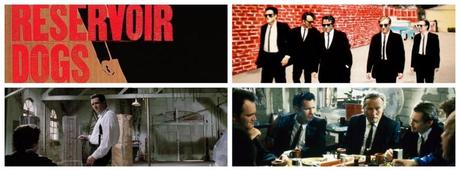
What It's About: In the immediate aftermath of a heist-gone-wrong, a group of criminals (Michael Madsen, Tim Roth, Steve Buscemi, and Harvey Keitel being chief among them) turn on each other as they try to sniff out the rat in their midst.
Backstory: In some alternate universe, Reservoir Dogs exists as a black-and-white oddity starring some guy named Quentin Tarantino and a bunch of his friends. However, thanks to Harvey Keitel that universe is far removed from our own.
The story goes that a 25-year-old Tarantino met Lawrence Bender, a former ballet dancer turned actor turned movie producer, at a party in 1989. By that point, Tarantino had already written True Romance and Natural Born Killers, and as luck would have it Bender had read the former and liked it. When Tarantino told him about his idea for Reservoir Dogs, Bender encouraged him to go and write it. If it came out great, he'd help him find the money to get it made.
Of course, it did turn out great, a brazen amalgamation of other movies - The Taking of Pelham One Two Three, The Killing, City on Fire - yet somehow entirely its own thing. Tarantino, however, was fed up with waiting for money. He'd already put in six years of trying to get someone to finance one of his scripts. His instinct was to self-finance Reservoir for $10,000 and shoot it on 16mm film in black-and-white, filling the cast with his buddies. Bender convinced him to wait, and they signed an agreement on a paper napkin to go into business together on this movie.
What commenced from there was a classic Hollywood story of luck and happenstance. Bender happened to know cult director Monte Helman, who wanted to direct the movie himself but was so charmed by Tarantino he agreed to executive produce and took it to B-Movie company Live Entertainment (later known as Artisan) where an executive named Richard Gladstein took it on as his own pet project. Gladstein offered them a guaranteed budget of $1.3 million if they could get one of the following three actors: Christopher Walken, Dennis Hopper, or Harvey Keitel. Get two of them, the budget would go up to $2 million.
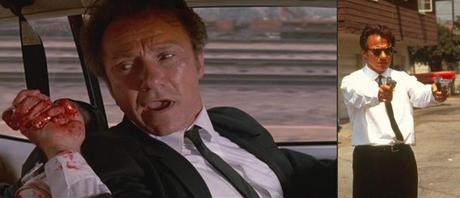
Again, Bender just happened to have a connection. This time, the wife of his acting coach knew Keitel from the Actors Studio and agreed to pass along the Reservoir script. After reading it and meeting with Tarantino, Keitel agreed to play Mr. White and became the project's biggest champion in Hollywood. While he tried and failed to recruit Walken and Hopper, he did use his own money to fly himself, Bender, and Tarantino to New York for casting sessions, and it was his name being attached to the project which attracted so much talent.
The casting process was not without its hassles. James Woods, for example, was offered the part of Mr. Orange but his agent turned it down without even telling him about it. Tim Roth refused to audition and sort of got tricked into doing it after Tarantino took him to a bar got get shit-faced drunk together.
The actual filming wasn't always smooth either, with most of the on-set horror stories related to Laurence Tierney, a Hollywood lifer who had done hard time and had a possible additional 5-year sentence hanging over his head due to shooting a gun through his apartment walls and narrowly missing the family next door. He was gruff, routinely forgot his lines, and talked back to Tarantino, who had only cast him out of fandom for the actor's work in 1945's Dillinger.
However, the biggest hassle didn't truly arrive until Sundance 1992. Tarantino and his editor Sally Menke, who took the job partially because of Keitel's involvement, finished their cut three days before the Festival. Audiences were stunned by the violence. Infamously, horror movie vets like Wes Craven and Rick Baker left screenings early. This notoriety helped make Reservoir the most talked-about film of the Festival, but it didn't win any awards and distributors were nervous about the ear-slicing scene.
Miramax's Harvey Weinstein wanted to do business with them but only if they agreed to lose that scene. He even used his wife and her sister as guinea pigs in an experiment meant to prove his point that the scene would lose audiences. They were sat down in a screening room and showed the movie and, sure enough, when the ear-slicing happened they stormed out. 15 minutes later, though, they were back. "I thought you hated the movie; how come you came back?" Weinstein asked. "We wanted to find out what happened" was his wife's reply.
Tarantino had just won the argument.
Quentin's Take: "I didn't have an idea of how to shoot a single scene..but I was the happiest I'd ever been in my life. I was living my dream and my dream was going to be great."
My Take: Reservoir Dogs became the Velvet Underground of independent film: it didn't sell many tickets, but everyone who bought one went out and became a filmmaker or at least someone who wrote about movies professionally. There is, for example, no speech about Death Star contractors in Clerks if Kevin Smith doesn't see Reservoir's opening Madonna "Like a Virgin' speech and realizes movie characters can actually talk like that. Half of the people who now write for sites like The Ringer probably would have pursued entirely different careers if their minds hadn't been blown by Reservoir Dogs in their pre-teen years.
Which is why it is hard for some to support any list which doesn't automatically put Reservoir in at least the top 5. If you lived through this film's cultural moment, it probably meant a lot to you. It might have even changed your life. At the very least you certainly had that poster with the dudes in their suits slow-motion walking.
However, nearly three decades later Reservoir's bag of tricks - non-linear storytelling, scoundrel protagonists, vulgar dialogue, extreme violence, exceedingly clever needledrop moments - have all been repeated in later Tarantino movies to better effect. Moreover, while I appreciate the father-son nuances at play in the Mexican standoff finale - Mr. White protecting his surrogate son, Mr. Orange, while Nice Guy Eddie protects his dad - I've never totally felt Mr. White's turn and affection for Mr. Orange. It's still a thrilling and masterfully put together film, but when I watch it now I see the work of someone who was just about to making something so much better.
Favorite Scene:Nothing that happens in Reservoir Dogs is based on anything Tarantino personally experienced. It's all just stuff he pulled from other movies, except for this wonderful sequence of Mr. Orange learning his lines. This is the aspiring actor part of Tarantino shining through with first-hand knowledge of what this tedious process is actually like.
5. Kill Bill: Vol. 1 (2003)
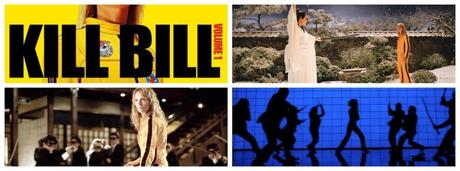
What It's About: An ex-assassin (Uma Thurman) gunned down at her wedding awakes years later from a coma and immediately sets out on an epic revenge quest against her former comrades/attackers (Vivica A. Fox, Lucy Liu, Michael Madsen, Daryl Hannah, David Carradine).
Backstory: Crediting its story to "Q&A," Kill Bill began its life as something Quentin and Uma thought up in-between takes on the Pulp Fiction set. A stray conversation about his love of old kung fu movies led to the pair hashing out a killer opening scene for a throwback vengeance movie where we start on a woman in a wedding dress being shot in the head by her old gang, the Deadly Viper Assassination Squad, loosely modeled on the Fox Force Five TV pilot Uma's character describes in Pulp Fiction. The rest - who is this woman? why did they attack her? how is she going to get her revenge? - could be reverse-engineered from there.
Tarantino loved the idea enough to go home that night and jot down the first thirty pages of the script. A year later, he told Robert Rodrigeuz all about it and recited much of the dialogue which would later make it into the movie. However, just like that Tarantino seemed to drop it in favor of focusing on a WWII screenplay. If not for Uma asking him about their old idea in 2000, he might never have gone back to Kill Bill, but at her prompting he found the old pages and promised Uma he would finish the script as a birthday present to her. He told her it would be done in two weeks; it took a year and half, and she certainly wasn't expecting it to end up being 220-pages long.
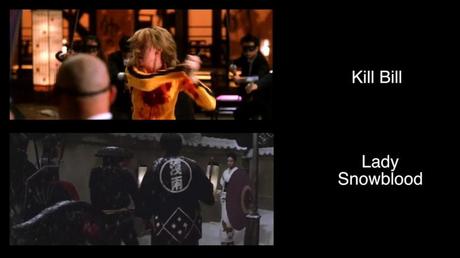
The timing couldn't have been worse. Here was a script in which Tarantino wanted Uma to play his version of Lady Snowblood, but she was about to have her second child. Warren Beatty had already agreed to play Bill, and all the engines were in motion to start production. They could either move forward without Uma or wait for her; Tarantino chose to wait.
In the year that followed, Beatty, who didn't really like kung fu movies in the first place and always had one foot out the door, left the project. When they met again to try to mend fences, Tarantino casually mentioned he wanted Beatty to be like David Carradine in the movie, to which the frustrated actor bitterly retorted, "Why don't you offer it to David?" Not a bad idea.
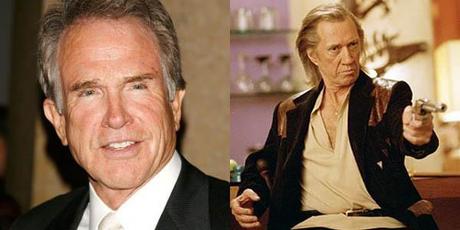
Three months after Uma gave birth to her son, Levon, she reported to a six-week training program with the rest of the cast. The Matrix and Crouching Tiger, Hidden Dragon 's martial arts choreography taught them sword fighting, knife fighting, and hand-to-hand combat, but to Uma's horror Tarantino dropped most of the choreography they'd learned on the first day of shooting in China and embraced a more improvisational style ala what the Beijing crew was used to.
It was the start of a wildly hectic shoot. Filming in China, for example, was only supposed to take 21 days; it went on for 76, and they still had material to film in Los Angeles and Mexico. Naturally, the budget ballooned from $39 million to $55 million. The 840,300 feet of film validated Tarantino and Menke's earlier instinct that this needed to become two movies, not one. Tarantino, it seemed, had his first nightmare production.
When the first volume of the film finally hit theaters, Thurman said, "I am really so happy with it. And so happy that it's over." Except, of course, the nightmare wasn't over. News of the car wreck she suffered on the set wouldn't come out for another decade.
Quentin's Take: "When I was first starting out I looked at the great action directors and to me those were the real directors. That was cinema. With Kill Bill, I wanted to test myself, see how good I am. I wanted to risk hitting my head on the ceiling of my own talent. The only reason for me to do it was to raise the bar. I used to say, ' Kill Bill has to be to fight scenes what the ''Ride of the Valkyries' scene in Apocalypse Now is to battle scenes, or else I will have failed.' Completely."
My Take: Uma Thurman put it best, "It's a movie about a woman who challenges five people to duels. That's pretty much it. My job was to take the character out of Quentin's wildly creative, improvisational world and make her human. If the movie was going to be more than just a cartoon, it was up to me [...] In some ways, I was in a silent film. The physicality of it is what it's about for Quentin."
And for me Kill Bill doesn't actually escape the realm of cartoon until Vol. 2. Thurman's humanity doesn't totally shine through until the next movie where we get her backstory and see how her rise and fall led to her vengeance quest. The moment at the end of Vol. 2 when she playacts falling dead as her daughter fires imaginary bullets crystalizes how much of the entirety of Kill Bill to that point is just kids play. It's the work of Tarantino recreating Shogun Assassin and all other movies he used to watch at home with his mom before finally getting to the point. Tarantino - born to a single mother and raised with inconsistent father figures - is again working through his father issues, and Bill doesn't actually arrive to exorcise those demons until the second movie.
That's why I have Vol. 2 ranked higher. It is the half of the Kill Bill saga which has all of depth, but as a pure adrenaline ride of blended genres, wild mayhem, and top-this-motherfucker showmanship Vol. 1 is a freakin' tour de force. The dude wanted to set the standard for fight scenes, and even in a post- John Wick universe Kill Bill: Vol 1 still sets the fight scene bar pretty high, largely because who else but Tarantino would think to stage an epic fight in the living room and kitchen of a suburban house in Pasadena where an innocent kid is due to come home from school any minute.
Favorite Scene:The whole ending, really, always blows me away.
Only Inglourious Basterds, Jackie Brown, Kill Bill: Vol. 2, and Pulp Fiction are left. Which one will I put at #1? Come back tomorrow to find out.Source: Empire July 1, 2019,Tom Shone's Tarantino: A Retrospective
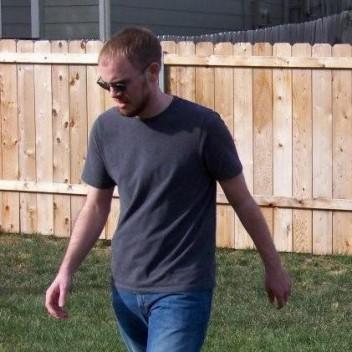
Grew up obsessing over movies and TV shows. Worked in a video store. Minored in film at college because my college didn't offer a film major. Worked in academia for a while. Have been freelance writing and running this blog since 2013. View all posts by Kelly Konda

